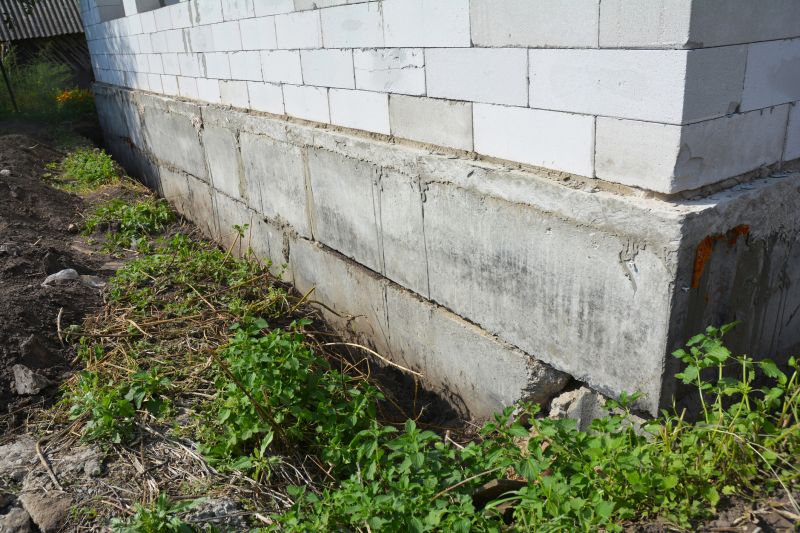Ultimate Guide To Concrete Repair Products For Long-Lasting Fixes
A comprehensive overview of essential tools and materials to ensure durable and professional-looking concrete repairs.
 Concrete repairs are a common necessity for maintaining the integrity and appearance of various structures, including driveways, sidewalks, foundations, and patios. When addressing concrete issues, it is essential to select products that are compatible with the existing material and suited to the specific repair needs. From patching compounds to sealers, the range of available products can help restore strength and prevent further deterioration. Proper preparation and application are key to achieving durable results, making the choice of the right repair products a critical step in the maintenance process.
Concrete repairs are a common necessity for maintaining the integrity and appearance of various structures, including driveways, sidewalks, foundations, and patios. When addressing concrete issues, it is essential to select products that are compatible with the existing material and suited to the specific repair needs. From patching compounds to sealers, the range of available products can help restore strength and prevent further deterioration. Proper preparation and application are key to achieving durable results, making the choice of the right repair products a critical step in the maintenance process.
Top Overall Option
Multi-Purpose Concrete Repair Compound
A versatile concrete repair compound designed for filling cracks, patching holes, and restoring surface smoothness. It offers good adhesion to existing concrete and can be used for interior and exterior applications. Its user-friendly formulation makes it suitable for both DIY enthusiasts and professional contractors, providing a durable and reliable repair solution.
Types of Products For Concrete Repairs
Concrete Crack Filler
Specialized products formulated to fill and seal cracks in concrete surfaces, helping prevent water infiltration and further damage.
Concrete Patching Compound
Materials designed to repair holes, spalls, and surface imperfections, restoring structural integrity and appearance.
Polyurethane Sealant
Flexible sealants ideal for sealing joints and cracks that experience movement, providing waterproofing and sealing properties.
Epoxy Concrete Repair
High-strength epoxy formulations used for structural repairs, bonding new concrete to old, and filling deep cracks.
Hydraulic Cement
Quick-setting cement used for emergency repairs, especially effective for sealing leaks and stopping water ingress.
Concrete Resurfacer
Thin-layer coatings that restore the surface of worn or spalled concrete, providing a fresh appearance and additional protection.
Waterproofing Sealers
Sealants designed to prevent water penetration, extending the lifespan of concrete surfaces exposed to moisture.
Polymer Modifiers
Additives that improve the flexibility, adhesion, and durability of repair compounds, suitable for challenging conditions.
Surface Bonding Agents
Primers or bonding agents that enhance adhesion between old and new concrete layers during repairs.
Expansion Joint Fillers
Materials used to fill and seal expansion joints, accommodating movement and preventing debris buildup.
Concrete Sealers and Coatings
Protective layers applied over repaired or existing concrete to prevent damage from water, stains, and chemicals.
Rapid-Set Repair Mixes
Fast-curing formulations suitable for urgent repairs, minimizing downtime and disruption.
Flexible Repair Mortars
Mortar mixes that accommodate movement and vibration, ideal for repairing areas prone to cracking.
Patch Repair Kits
All-in-one kits that include everything needed for small-scale concrete repairs, convenient for DIY projects.
Popular Choices
Widely used for sealing cracks in driveways and sidewalks, helping to prevent water intrusion.
Commonly chosen for quick fixes of leaks and cracks that require immediate sealing.
Popular for structural repairs and bonding applications, providing strong adhesion and durability.
Often selected to restore worn or spalled concrete surfaces with a smooth finish.
Trending for protecting concrete from moisture damage in exterior applications.
Preferred for quick repairs that need minimal downtime, especially on high-traffic surfaces.
Chosen for flexible sealing of joints and cracks where movement occurs.
Popular for enhancing adhesion during concrete overlays or repairs.
Frequently used in large slabs and pavements to accommodate expansion and contraction.
Commonly applied to protect and extend the life of concrete surfaces.
Different types of concrete repair products serve various purposes, such as filling cracks, patching holes, or sealing surfaces against moisture ingress. Some products are formulated for quick setting, ideal for time-sensitive repairs, while others offer extended working times for more precise application. Consideration of the concrete's location, exposure conditions, and the extent of damage can influence the selection process. Using high-quality products designed specifically for concrete ensures better adhesion, longevity, and overall performance.
In addition to repair compounds, surface treatments like sealers and coatings can protect concrete from future damage caused by water, chemicals, or temperature fluctuations. These products can enhance the appearance and longevity of the repaired area, providing a seamless finish. When selecting concrete repair products, it is also important to evaluate ease of use, compatibility with existing surfaces, and drying or curing times to fit project timelines. Properly chosen products, combined with correct application techniques, can help extend the lifespan of concrete structures and maintain their safety and functionality over time.
Key Buying Considerations
- Determine the type and extent of damage to select the appropriate product.
- Consider whether the repair is structural or cosmetic to choose suitable materials.
- Check compatibility with existing concrete surface materials and conditions.
- Evaluate the product's curing or drying time to align with project timelines.
- Assess ease of application, especially for DIY projects or professional use.
- Look for products with good adhesion properties to ensure long-lasting repairs.
- Consider environmental exposure, such as moisture, chemicals, or temperature fluctuations.
- Choose products that offer flexibility if the repair area is subject to movement.
- Review manufacturer instructions for surface preparation and application techniques.
- Select repair compounds that match the color and texture of existing concrete if appearance matters.
- Verify if the product is suitable for interior, exterior, or both applications.
- Assess the product's resistance to water, chemicals, or freeze-thaw cycles for durability.
- Determine if the product is suitable for quick fixes or requires longer curing times.
- Check for compatibility with other repair or sealing products being used.
- Review customer feedback and product ratings for insights into performance and ease of use.
